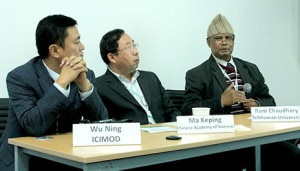(English) Transboundary cooperation key to biodiversity conservation: Experts


KATHMANDU, Nepal–Experts have highlighted the need for sharing and collaboration across borders to achieve global biodiversity conservation targets.
During a symposium Convention on Biological Diversity in the Capital Kathmandu, Thursday, conservation scientists, development practitioners and policy makers highlighted the need for greater cooperation among different countries to conserve biodiversity in landscapes that cross international borders.
The side event on ‘Opportunities and Challenges in Conserving Biodiversity in Transboundary Landscapes for Sustainable Development in Hindu Kush Himalayas’ raised awareness among the international community on the importance for transboundary cooperation to achieve global conservation and development targets, particularly in mountain regions like the Hindu Kush Himalayas.
Prof Wu Ning, Ecosystem Services Thematic Leader at the International Centre for Integrated Development (ICIMOD), spoke about the significance of ecosystems in the Hindu Kush Himalayan region, emphasizing the linkages between the upstream and downstream areas.
“We need to adopt integrated ecosystem management approaches to conserve biodiversity and cultural values and ensure the flow of ecosystem goods and services across interconnected landscapes”, he said adding the need for researchers from different countries to use common methodologies.
The symposium also highlighted the need for enhanced collaboration in terms of capacity development, technology transfer, generating bottom-up critical evidence, greater sharing of research data and learning, and the creation of an enabling policy environment to contribute to global biodiversity conservation.
“Transboundary networking and cooperation at a regional scale is needed to enhance knowledge and data sharing”, said Prof Ma Keping, Secretary General for CNC-DIVERSITAS and professor at the Chinese Academy of Sciences. He added that ICIMOD’s regional initiative focused on promoting transboundary landscape management has made valuable data available through the Asian Biodiversity Conservation and Database Network (ABCDNet).
Mr Hem Pande, Additional Secretary at the Ministry of Environment, Forests and Climate Change, Government of India, emphasized the concept of “ecology without borders”. Sharing examples of community-based forest management in Nepal, he stressed the value of sharing learning from these types of successful experiences at the transboundary scale.
Nepal has already endorsed its National Biodiversity Strategies and Action Plan, which provides policy instruments for transboundary cooperation in biodiversity conservation in Nepal.
Joint Secretary at the Ministry of Forests and Soil Conservation, Government of Nepal recognized Nepal’s bilateral working agreement with the governments of India and China for effective transboundary cooperation and action.
The event was co-organized by the International Centre for Integrated Mountain Development (ICIMOD); Ministry of Environment, Forests and Climate Change, Government of India; and Ministry of Forests and Soil Conservation.
